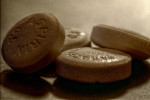
Aspirin may help slow knee osteoarthritis new research claims
 Aspirin could provide benefits when it comes to the slowing of knee osteoarthritis progression, says a study in Maturitas, The European Menopause Journal.
Aspirin could provide benefits when it comes to the slowing of knee osteoarthritis progression, says a study in Maturitas, The European Menopause Journal.
Experts were interested in if low-dose aspirin affects change in knee cartilage volume. They took 117 people with osteoarthritis, of whom 21 people were regular users of aspirin. Everyone’s knees were imaged twice over two years and any changes calculated.
Results showed that the yearly reduction in medial tibial cartilage was lower in aspirin users than in non-users, even after adjusting for age, gender, body mass index and radiographic severity.
“Low-dose aspirin use was associated with reduced medial tibial cartilage loss over two years in people with knee osteoarthritis,” the research group says. “Clinical trials are required to confirm efficacy. If this hypothesis is confirmed, low-dose aspirin may be used to reduce the progression of knee osteoarthritis.”
Aspirin is commonly used for pain relief and in the prevention of cardiovascular disease because it has anti-inflammatory and vasculoprotective effects.
A spokeswoman for Arthritis Research UK comments:
“Nonsteroidal anti-inflammatory drugs such as aspirin can be used to reduce the pain of knee osteoarthritis. This study raises the interesting suggestion that a low dose of aspirin may also be able to prevent cartilage loss.
“This is an intriguing theory which would have to be tested in much larger numbers of people in clinical trials before patients could be advised to take aspirin not to relieve pain, but to reduce loss of cartilage.”
Click here to read the original research.
Subscribe to Arthritis Digest, the UK’s fastest growing arthritis magazine for all the latest arthritis news, reviews and celebrity interviews. You’ll know what your doctor is talking about, what new drugs are in the pipeline and be up to date on helpful products. Hard copy and digital versions both available. Click here for more information.
Image credit: Christian Prade
